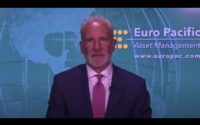The Fed Gives Banks a Clean Bill of Health. The Stock Market Hasn’t.
The biggest commercial banks survived in the Federal Reserve’s nightmare hypothetical scenario of an economic collapse.
A real-world test is coming. To be sure, if the U.S. goes into recession in the next few months, it probably won’t be so severe that unemployment rises to 10%, as it does in the stress test.
But Federal Reserve Chair Jerome Powell has nevertheless made it very clear that aggressive interest-rate increases will keep coming. Although he is sensitive to how that will hurt demand, his priority is bringing down inflation. The market is pricing in a mild economic contraction already.
Newsletter Sign-up
The Barron’s Daily
A morning briefing on what you need to know in the day ahead, including exclusive commentary from Barron’s and MarketWatch writers.
In theory, commercial banks stand to benefit from rising central bank rates, as it allows them to expand margins on their loans. Combine that with an economic downturn, though, and investors aren’t so sure. The
SPDR S&P Bank
exchange-trade fund is down 20% this year, similar to the broader
S&P 500.
And then there is the risk that the outlook is worse than currently imagined.
JPMorgan Chase
CEO Jamie Dimon said earlier this month that a “hurricane” is coming. “You’d better brace yourself,” he warned.
For Dimon, that means being very conservative with JPMorgan’s balance sheet. We will see if he and other banks follow through when they start announcing dividends and buybacks on June 26. After having distributions capped during the Covid-19 pandemic, it will be tempting to shower investors with rewards.
But if everyone is thinking like Dimon about the hurricane, shareholders will probably be disappointed.
—Brian Swint
*** Join Penta senior writer Abby Schultz today at noon as she talks to Melissa Berman, founding president and CEO of Rockefeller Philanthropy Advisors, and Olga Tarasov, director of knowledge development at RPA, about what’s going on with philanthropy today and a tool they have developed to guide donors in being more effective. Sign up here.
***
Investors Await Payout Amounts After Banks Pass Stress Tests
Banks passed the Fed’s annual stress tests, demonstrating strong capital levels that would enable them to continue lending even through a severe economic downturn. Now investors want to know how much extra money banks have to return to them in dividends and share buybacks.
- The testing began after the 2008-2009 financial crisis. This year, the Fed tested how banks would do if unemployment rose to 10%, commercial real estate prices dropped 40%, home prices fell 28.5%, bond spreads widened, stocks fell 55%, and market volatility spiked.
-
The results showed banks would still be above their minimum capital requirements even if they collectively faced hypothetical loan and trading losses of $612 billion. The 34 banks tested included
Goldman Sachs
,
JPMorgan Chase, andWells Fargo
. - The Fed made this year’s test harder than last year’s. The central bank temporarily prevented stock buybacks and capped dividend payouts in 2020 as the pandemic took hold, lifting those restrictions last year.
- Given the uncertainty in the current market climate, with interest rates rising and the cooling housing market, analysts expect share buybacks could be more limited than in recent years as banks use more caution.
What’s Next: While the Fed’s decisions were released on Thursday, banks have to wait until June 26 to reveal their dividend and buyback plans as well as confirm the size of their stress capital buffers.
—Liz Moyer and Carleton English
***
Senators Pass Bipartisan Law to Curb Gun Violence
A group of senators from both parties passed new legislation late Thursday aimed at curbing gun violence. The legislation includes funding for mental health and school safety following a spate of recent deadly mass shootings in the U.S.
- The vote, which had a 65-33 split, came after long negotiations, led by Sens. Chris Murphy (D., Conn.) and John Cornyn (R., Texas), who were charged with finding a compromise by their party leaders, according to The Wall Street Journal.
- The legislation includes resources for states to create and administer so-called red flag laws, which take firearms away from individuals deemed by a judge to be a danger to themselves or others. Also included are enhanced background checks for buyers under 21 years old.
- President Joe Biden said: “Tonight, after 28 years of inaction, bipartisan members of Congress came together to heed the call of families across the country and passed legislation to address the scourge of gun violence in our communities.”
- Separately, New York state’s process of requiring gun owners to have permits for concealed weapons was struck down on Thursday by the Supreme Court.
What’s Next: The Democratic-led House of Representatives should promptly vote on the bipartisan bill, which Biden has said he wants sent to his desk.
—Rupert Steiner and Liz Moyer
***
Airlines Cut Services Amid Flight Delays and Staff Shortages
As global travelers embrace the first restriction-free summer since the start of Covid-19, the airline industry is struggling with flight cancellations, delays, and scaled-back services—partially due to the staff shortages caused by job and pay cuts during the pandemic.
-
United Airlines
will cut about 50 daily flights from Newark Liberty International Airport starting in July to ease delays. The airline blamed capacity constraints, airport construction, and air-traffic control, not staffing shortfalls. -
American Airlines
will stop flying to four small cities in the U.S.—Toledo, Ohio; Islip, N.Y.; Ithaca, N.Y.; and Dubuque, Iowa—starting in September, blaming the service cuts on a shortage of regional pilots. -
Other carriers are also trimming down their services this year, including
Delta Air Lines
,JetBlue Airways
,Spirit Airlines
,Southwest Airlines
,
andAlaska Airlines
.
Many cut jobs during the pandemic, only to be caught flat-footed when travel demand snapped back in 2022. -
Union workers are voting to strike over working conditions and pay, including
British Airways
’ ground staff at London’s Heathrow Airport,Ryanair
workers in several European countries, and crews at Brussels Airlines. In the U.S., 1,300 Southwest Airlines pilots protested this week against inadequate pay and long hours.
What’s Next: Long lines could await the large number of people that plan to travel this summer. The U.S. Travel Association expects Americans to spend $95 billion on travel this year. Six in 10 Americans are expected to take at least one summer trip.
—Evie Liu
***
Takeaways From the Barron’s Investing in Tech Summit
Supply-chain disruptions, Congressional support for new tech funding, and life after the pandemic were just a few of the topics explored on Thursday at the Barron’s Investing in Tech virtual summit, where 14 industry leaders including
Intel
,
Cisco
,
Zoom Video
,
and others talked about opportunities ahead.
- Intel’s CFO David Zinsner said speed of the chip maker’s massive spending on new manufacturing hubs may depend on Congress, which is still completing a bill that would provide $52 billion of funding to build the domestic chip industry.
- Intel is delaying the groundbreaking ceremony for a planned chip-making facility in Ohio—originally scheduled for July 22—in an expression of frustration over the slow progress, the company confirmed to Barron’s.
- Supply chains will remain disrupted for another 12 months or potentially 18 months, according to Resilinc CEO Bindiya Vakil. Resilinc uses artificial intelligence to monitor supply chains.
- Zoom Video, which grew from 10 million daily meeting users in December 2019 to 300 million by April 2020, is transforming into a full communications platform now that people are returning to offices, CFO Kelly Steckelberg said. Zoom wants to be the “operating system for your workday.”
What’s Next: Cisco CFO Scott Herren said hybrid work isn’t going away, and though supply-chain issues have continued to drive costs higher, the opportunities are increasing for its WebEx videoconference and communications business and security and networking products.
—Evie Liu and Barron’s Staff
***
FedEx’s Outlook Sees Efficiency Moves Boosting Profitability
FedEx
forecast 2023 earnings well above Wall Street’s expectations, as the global logistics company emphasizes $6.8 billion in spending to improve efficiency, modernize its facilities and fleet, and increase automation.
- Fourth-quarter earnings of $6.87 a share met expectations. Freight and Express operating income rose 67% and 20%, respectively, but Ground division income fell 23% because of higher costs from insurance, wages and payments for transportation.
- The profit margin rose to 9.2% from 8.7% in the year-ago quarter. CFO Mike Lenz said “We expect further momentum in fiscal 2023 and beyond as we execute on our initiatives to drive increased profitability and returns.”
- FedEx has increased its fuel surcharge fee several times since March to account for fluctuations in fuel prices. The price of diesel fuel used to power big trucks is up nearly 40% since the end of February.
- Fuel surcharges and higher shipping fees helped overcome lower shipping volume. Operations continue to see supply-chain disruptions and a tight labor market. Like competitors, FedEx raised wages to attract and retain workers.
What’s Next: FedEx projects earnings between $22.50 and $24.50 a share for the fiscal year 2023, which began in June. The midpoint of that range, $23.50, is more than $1 higher than the average analyst estimate.
—Liz Moyer
***

Do you remember this week’s news? Take our quiz below about this week’s news. Tell us how you did in an email to [email protected].
1. Which U.S. natural-gas exporter became the first to pen a deal with a German energy company to start selling liquefied natural gas to Germany starting in 2026?
a. Venture Global LNG
b. Cheniere Energy
c. TotalEnergies
d. Shell
2. Which food giant is splitting into three companies in a push to jump-start its larger, faster-growing snacks business?
a. General Mills
b. Campbell Soup
c. Kellogg
d. Danone
3. Some companies are beginning to rescind recent job offers as they shift their business outlook in an uncertain economic environment. The companies include:
a. Twitter
b. Coinbase Global
c. Redfin
d. All of the above
4. What was the key takeaway from Powell’s congressional testimony this week?
a. That recession was certainly a possibility
b. That recession can ultimately be avoided
c. That it’s essential to bring down inflation
d. A and C
5. FTSE Russell is scheduled to rebalance its indexes today and some former growth darlings are expected to join the Russell 1000 Value index. Which company won’t be rebalanced into the value index?
a. Meta Platforms
b. Tesla
c. Netflix
d. PayPal Holdings
Answers: 1(a); 2(c); 3(d); 4(d); 5(b)
—Barron’s Staff
***
—Newsletter edited by Liz Moyer, Camilla Imperiali, Steve Goldstein, Rupert Steiner
[ad_2]
Source link
Related Posts

How Did We Get Here: The Coming Standardization for Policy Implementation of ESG

Peter Schiff: Bank Bailouts Will Devalue the Dollar
